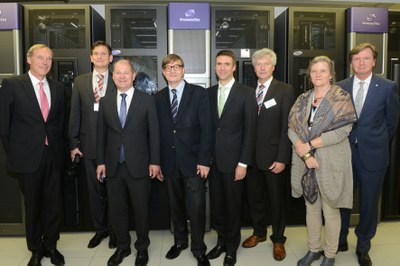05.10.2015
First Mayor of the City State of Hamburg, Olaf Scholz, the Parliamentary State Secretary in the Federal Ministry of Education and Research (BMBF) Stefan Müller and further honored guests inaugurated the new supercomputer “Mistral” with an official opening ceremony on October, 5th. Olaf Scholz stated confidently that „Hamburg has long been recognized as one of the climate research capitals”. Stefan Müller particularly emphasized that the combination of a supercomputer, an especially large hard-drive system and one of the hugest climate data archives worldwide helps to secure Germany's leading position in the field of climate research. “Mistral gives us the opportunity to set an important sign in a climate policy-relevant year,” said Müller and went on to say: "It is up to science to identify ways to deal with the risks, so that finally a breakthrough in the upcoming negotiations at the COP21 conference in Paris can be achieved."

Earth system scientists will carry out complex climate projections on Mistral, as they have done on its predecessors. The results of these projections regularly contribute to the IPCC world climate reports. Dr. Ludwig Kronthaler, Secretary General of the Max Planck Society, confirmed in his welcoming speech: "Only DKRZ’s infrastructure and services enabled German climate scientists to carry out the computations for the world climate reports.” Dr. Daniela Jacob, director of the Climate Service Center Germany, focused on the importance of the computations on a regional scale and on concrete matters: “Can a farmer grow bananas in the future in a certain region on earth?” Answers to this question will be delivered by climate models with high spatial and temporal resolution. Mistral enables scientists to run regional climate models with a spatial resolution of hundred meters.
Total investment costs for the new system and for the upgrade of the data archive are of the order of 41 million Euros, 2/3 of which are funded by the German Ministry for Education and Research (BMBF) and 1/3 by the Helmholtz Association (HGF).


Since July 2015 climate scientists have been working at DKRZ with the first installation phase of Mistral. In its final stage of expansion, which will be completed in summer 2016, Mistral will be 20 times faster than its predecessor although its energy consumption will remain the same. Its processing power will then more than double from 1.4 to 3 Petaflops, that is 3 quadrillion floating point operations per second. The storage capacity integrated into the system is larger than 20 Petabytes today and will even increase to 50 Petabytes in 2016.
The official ceremony was followed by a workshop in which the DKRZ users presented their current research projects and discussed with the DKRZ team their requirements in terms of infrastructure and services of the DKRZ. After the workshop about one hundred users used the opportunity to attend training. It was led by Hendryk Bockelmann, who gave an introduction to the new computer system.
Press release about the inauguration: here




